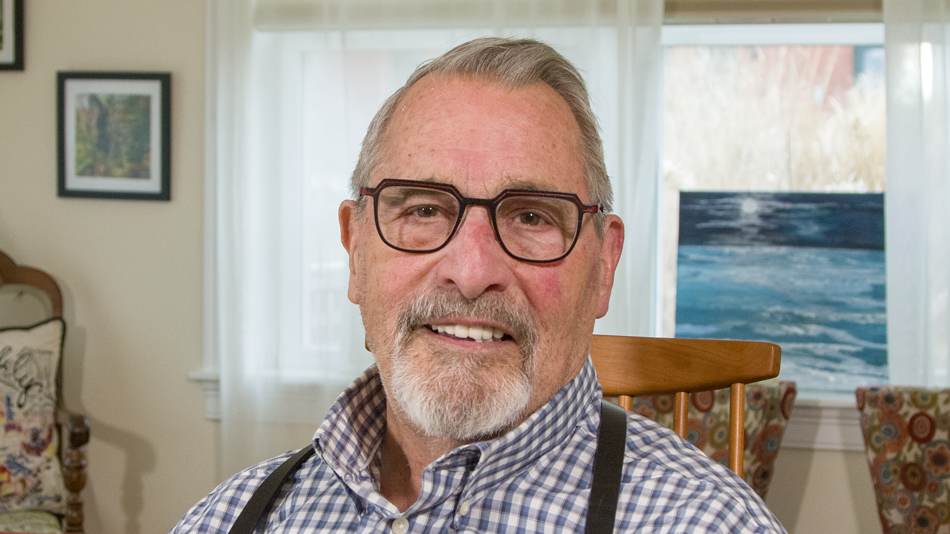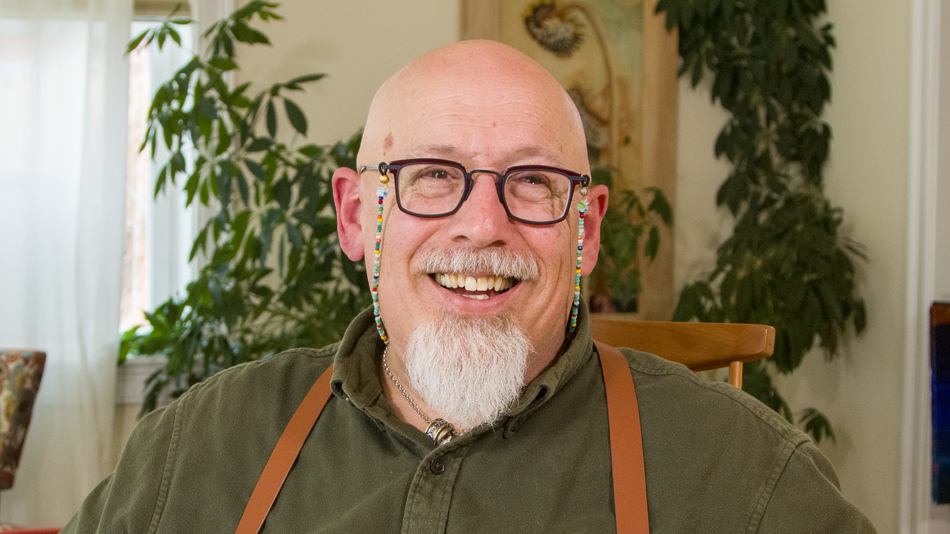I’m Rick Stuckey from Chicago, Illinois.
I’m Lutheran. I grew up Lutheran. I went to a Lutheran high school. And I always felt a little different.
It was summer, it was June, it was right after my birthday. It was Pride Month! There was a parade and I’m like, “Wow,” let me go see if I can find somebody that looks like me, that’s like me.”
I was just sitting on the curb watching the groups go by. All of a sudden. I saw a group called “Lutherans Concerned.” I’m like, what? I’m Lutheran. There’s people that are concerned? I’m like, wow, this is cool. Oh look, they’re handing out fliers, they’re handing out information. So I go and I take one and I hear this voice.
“Rick Stuckey?”
And I’m like, “Jerry?” Jerry was gay and he had been, I had found out that he’d been let go from the church because he was gay, because he was like go in the seventies when no church really was accepting. Seeing Jerry, it wasn’t like it was just one of my friends. It was one of my friend’s dad’s, someone who is an authority figure, someone who was a pastor, someone who’s a little bit older.
So Jerry’s like, “Hey, let’s get together sometime and grab a bite to eat, something to drink and we can talk. And if you have questions about being gay and being, you know, feeling more comfortable and helping you come out of your shell, I’m that guy.”
I’m like, “Okay.” So I called Jerry.
And he’s like, “Hey, let’s go to this place called Zephyr ice cream.”
There were two rooms. One was kinda noisy and the other one was more quiet.
So Jerry’s like, “Let’s go to the one that’s more quiet.” So he, you know, just said, “Hey, you know, I think I’ve known that you were gay before but I really couldn’t say anything. It was your own journey.” So Jerry’s like, “It’s okay, you know, God loves you, you know, there’s many other people like you.”
I’m like, “Really? There’s other gay Lutherans? There’s other people like me?”
He’s like, “Of course there are.” He invited me to this church group for Lutherans Concerned. They met, I think, once a month or maybe once a quarter, and it just felt so empowering to be around other people like me. And I met people that I still know a little bit of today.
Jerry also opened my eyes to people living with HIV. Because Jerry had said that he was HIV positive. Knowing someone who was HIV positive who was a friend, who was a role model, it opened my eyes to the struggles that people living with HIV have. HIV, before knowing Jerry was HIV positive, was that it was something scary, it was something, you know, the plague, it was bad, you know, you’d see all these people dying so fast.
And I’m like, “Wow. I don’t know who those people are, but they have names. They’re people. They have to have stories. But I didn’t really know any of their stories until I met Jerry.
I remember, it was Christmas. Maybe I know he doesn’t have a lot of energy, but I should call Jerry. It’s Christmas. He’s the guy who said it’s okay to be gay and Lutheran.
“I’m just calling to wish Jerry a Merry Christmas.” And he had died on Christmas. And I thought, wow, how interesting – a guy who loved God, who loved Jesus, who Jesus was born for us to die, and Jerry died on Christmas. So it was apropos. So it was a good ending to a horrible disease for a friend who I care about and remember and talk to one of my friends about all the time now.
Being a Lutheran, the thing that we’re taught is: help others. I’m like, well, since I found out that Jerry was HIV positive, there were AIDS organizations. There was one called, “AIDS Ministry, AIDS Assist.”
So that’s what I started doing and I met friends through there. That’s how I started getting involved with different organizations, different HIV organizations. That giving spirit has been embodied in me through my religion and by someone named Jerry who helped me feel it was okay to be gay and Lutheran.








Share